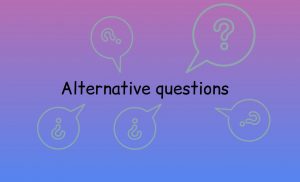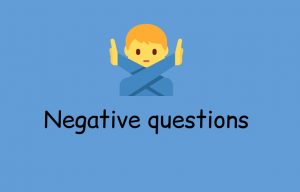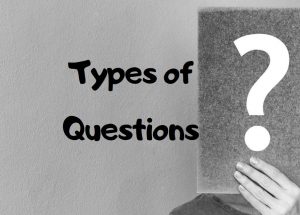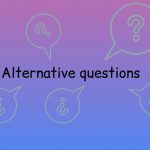Special questions in English are as easy to learn as general questions. Especially if you are learning the topic after you learned the general questions.
It can also be said that the topic “special questions” is an addition to the topic “general questions”.
Remember to read How to learn English with audiobooks for FREE
Why do we need special questions?
Special questions are questions that we ask in order to get additional information. We ask a special question when a general question is not enough.
Because we ask general questions to get a yes or no answer:
Question: Jack do you have any friends?
We ask this question just to find out yes/no if John has friends:
Answer: Yes, I do.
But what if we want to find out more. If we need to know how many friends John has?
The words “how many” are additional question words. These words turn a general question into a special one.
How many friends do you have?
Or we can use even a longer phrase:
How many of your friends do you like?
These additional words or phrases are the difference between a special question and a general question.
Special questions in the English language may differ in length, but their structure is always the same.
Examples:
Where did you find this doctor?
Where will you go with your history?
What do you feel for me?
How do you even know he was driving?
Where will this bizarre man stay?
How to form Special questions in English
We put a question word or phrase at the beginning of the sentence. Then we put an auxiliary verb or a modal verb or the verb to be. Then we put the subject. We can then add the rest of the sentence if needed.
Examples:
Where did you get this information?
Why did you get this information?
When did you get this information?
From whom did you get this information?
For what did you get this information?
The scheme looks like this:
Question word or phrase (when, why, how much, where) + Auxiliary verb (do, will, did) or modal verb (can, should, may) or verb to be (am, were, are) + Subject (I, We, John, People) + main verb (read, work, go) + rest of the sentence if necessary.
What do you know about love?
How can you think of food now?

✅ You can download a free PDF file with exercises on this topic.
How to answers special questions
The answer to a special question may be short:
Question: When are you going to see your aunt?
Answer: Tomorrow.
Or long:
Question: When are you going to see your aunt?
Answer: I am going to see her tomorrow.
In any case, the main purpose of answering a special question is to provide the necessary information.
Look at the different options for special questions and answers.
Question: When are you going to tell him?
Answer: Tomorrow morning.Question: How do I start screen sharing?
Answer: You should click the red button.Question: When do you want to meet him?
Answer: I don’t want to meet him at all!Question: Why are you pretending to laugh?
Answer: Because your joke isn’t funny.Question: How do we drop five points?
Answer: We lost the game.Question: Why does she need to leave town?
Answer: Because she needs to find a new job.Question: When do you want me to leave?
Answer: Now!
Special Question to the subject
Remember that in a subject question, the word order remains the same as in an affirmative sentence.
In a special question to the subject, we put a question word in the place of the subject:
We made a big sand statue on the beach.
We -> Who +?
Who made a big sand statue on the beach?
Negative form of special questions
A negative special question is no different from a positive special question, except for the negative particle not, which we put after the subject.
Auxiliary verbs/modal verbs/the verb to be with a negative particle not are usually abbreviated (n’t):
is not – isn’t
are not – aren’t
was not – wasn’t
were not – weren’t
do not – don’t
does not – doesn’t
did not – didn’t
have not – haven’t
has not – hasn’t
will not – won’t
can not – can’t
must not – mustn’t
should not – shouldn’t
Examples of negative special questions:
Why doesn’t she ever want you to leave the house?
Why didn’t you send him money?
Where didn’t you see me?
Why doesn’t she like me?
Where can’t you find a relic robe?
Why didn’t you run after them?
Question words
Take a look at the most popular question words we use to form special questions:
- which
- what
- whose
- What kind of
- who
- whom
- where
- whither
- whence
- when
- how
- How often
- How much
- How many
- How old
- How long
- What about
- What for
- What kind
Take a look at examples of using some of these words:
Why.
Why have you come at this hour?
Why did you buy such a fast car?
Why have you never called her?
When.
When can I come to see your office?
When can I get my video?
When did young people become so confident?
How.
How do you survive?
How will I ever repay you?
How do you two gentlemen feel about comedy?
How old.
How old was the boy you babysat for?
How old are your children, Joe?
How old will you be next year?
How many.
How many of us will survive?
How many countries have elected women?
How much.
How much fun was that?
How much time do we have?
How much fuel does the tank contain?
How long.
How long have we played this game?
How long has he served you?
How often.
How often have you visited her?
How often have we heard it?
How often do you get a gift like that?
What.
What work can I do?
What book do you want to read?
What person is that, then?
What kind.
What kind of family is this?
What kind of charm is that?
What for.
What for do you want her back again?
What for do you object to live in the palace?
What about.
What do you think about everything you just said?
Whom.
Whom did you hand the material?
Whom are you calling “darling”?
Whom can I contact for help?
Whose.
Whose interest does this serve?
Whose idea was the home invasion?
Whose side is he taking?
Where.
Where do they get these numbers?
Where will you go in the heat?
Where do you spend your time?

Who instead of whom
Who is a very popular question word.
Note that in modern English we usually use who instead of whom. However, if we want to make the sentence more formal we can use whom.
Whom do I fire for this? = Who do I fire for this?
What and which
The words what and which are very similar in meaning. When and how to use them correctly?
We use what when we are choosing from a variety of items or objects. Or when we ask about things or concepts in a general sense, without having in mind the choice among a specific number of things or concepts.
What do you know about being a manager?
What person are you?
We use which when we select from a limited number of items or objects:
Look at those cars. Which car are we talking about?
It’s a late time. Which restaurant is still open?
What vs What kind of
What is the difference between the question word What and the phrase What kind of?
It seems that what and what kind of are very similar and interchangeable. But in fact, there is a slight difference between them:
We use What if we ask a question in order to get an answer about what kind of object it is.
What house is that over there?
What car did you have before?
We use what kind of when we ask a question to find out about the quality, properties, characteristics of an item or object.
What kind of work is it, exactly?
What kind of car do you say it was?
✅ You can download a free PDF file with exercises on this topic.










